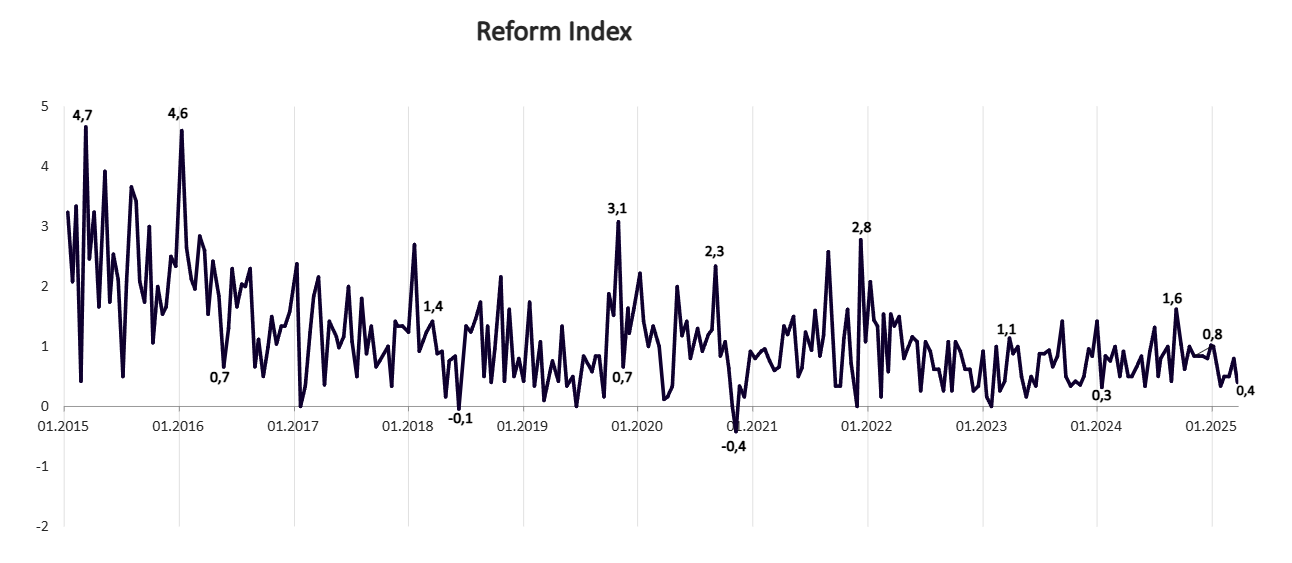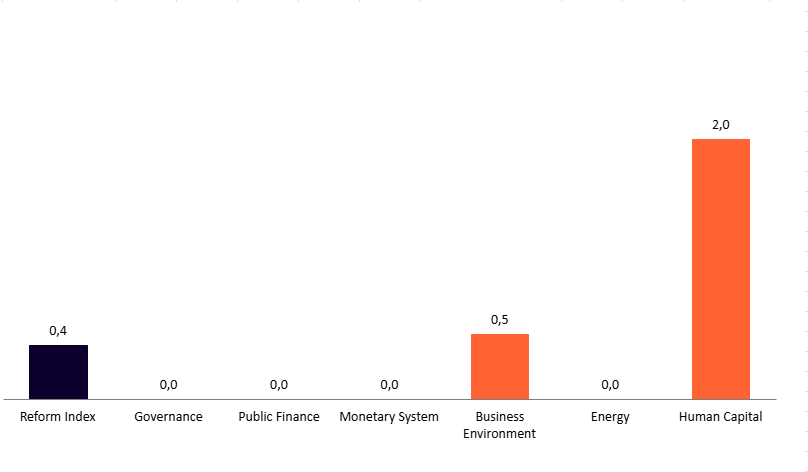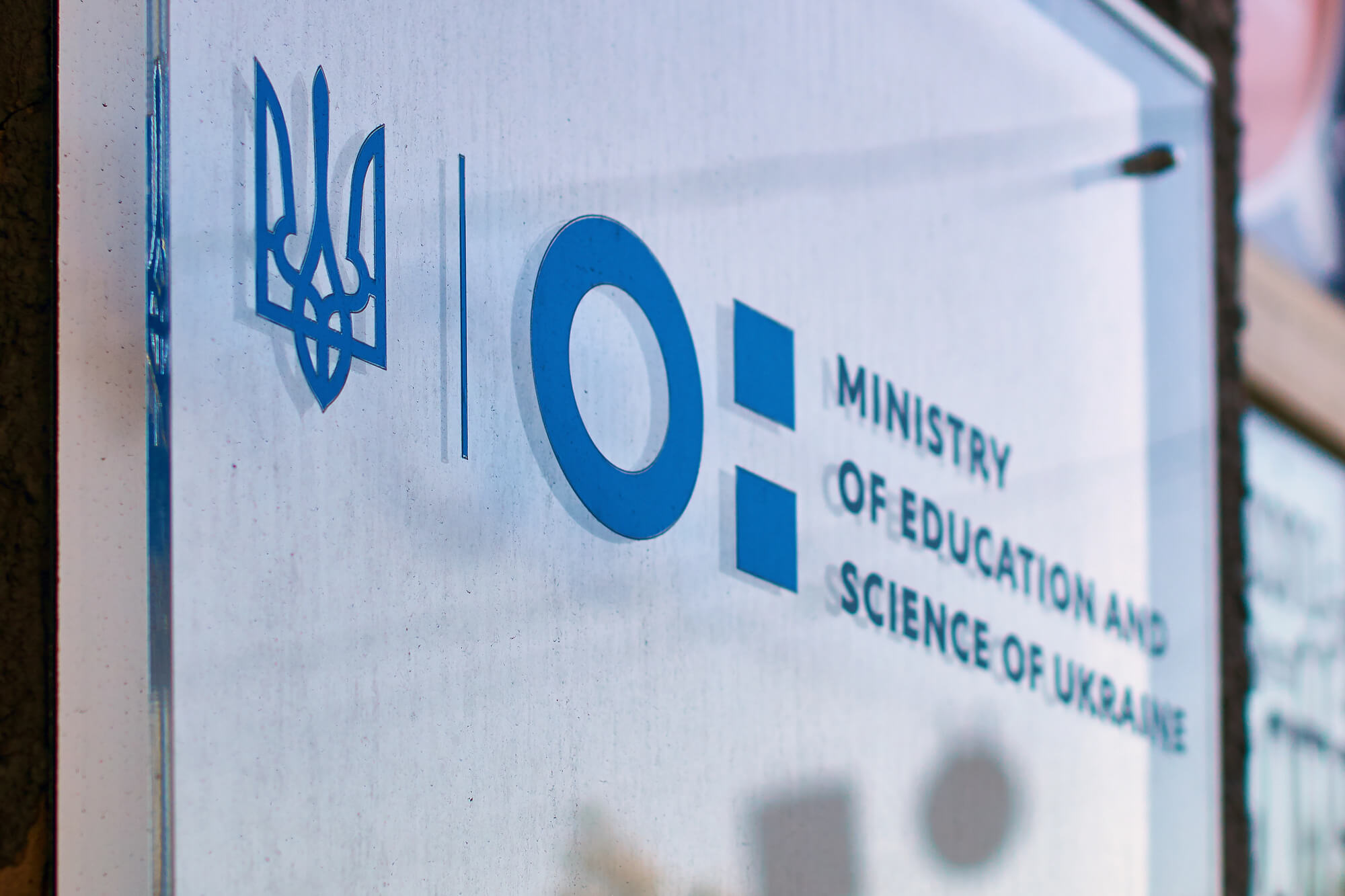Between March 10 and 24, Reform Index experts recorded four reforms, three of which fell under the “Human Capital” category.
Notably, the government regulated the procedure for blocking TV and radio signals from Russia, Belarus, Transnistria, and the occupied territories and introduced a requirement to enter the results of accessibility monitoring into the Register of Buildings and Structures. The key reform was a law recognizing learning outcomes obtained abroad (+2 points on a scale from -5 to +5). The overall Reform Index score for the period is 0.4 — half the score of the previous issue.
Graph 1. Dynamics of the Reform Index

Graph 2. Values of the Reform Index and its Components in the Current Assessment Round

Law on recognizing learning achievements obtained abroad, +2 points
Law No. 4265-ІХ enshrines the right of Ukrainians to have their foreign education credentials officially recognized. This applies to both formal and non-formal education, such as courses, webinars, training sessions, seminars, and masterclasses — whether conducted in person or online. Learning achievements will be recognized if acquired in any country except the aggressor states (Russia and Belarus). The Cabinet of Ministers must develop the recognition procedure within three months.
Information about the Reforms Index project, the list of Index experts and the database of the regulations assessed are available here.
Expert commentary
Dmytro Yarovyi, Associate Professor at the Faculty of Master’s Programs in Social Studies and Humanities, Kyiv School of Economics
“The new law recognizing learning achievements gained abroad is an important step toward supporting the thousands of Ukrainian children currently forced to remain outside the country. It addresses a long-standing issue: until now, both formal and non-formal education acquired abroad was not always recognized within the Ukrainian education system — placing a double burden on students. This law establishes a legal foundation for accepting such achievements and requires the Cabinet of Ministers to develop a straightforward implementation procedure.
The positive aspect is that this law creates a chance to avoid the stressful situation where a child is forced to study in two schools simultaneously — one abroad and one in Ukraine. It supports maintaining a connection to the Ukrainian education system without compromising children’s mental well-being. On the other hand, there is still no specific mechanism for implementing the law — everything will depend on how quickly and flexibly the government can prepare the necessary secondary legislation. This law does not directly encourage families to return to Ukraine, but if implemented properly, it removes one of the factors that previously pushed them away. It gives parents and children more space to make well-considered decisions.“
Blocking TV and radio signals from Russia, Belarus, Transnistria, and occupied territories, +0.75 points
The Cabinet of Ministers has approved regulations for the Special Television and Radio Broadcasting System (STRB). This system will block TV and radio signals originating from Russia, Belarus, Transnistria, and the occupied territories using specialized technical equipment.
Expert commentary
Volodymyr Zelenchuk, Media Lawyer at the Institute of Mass Information (IMI):
“The regulation on the Special Television and Radio Broadcasting System brings into the legal domain a system that has already been largely deployed in practice. It defines the objectives, principles of operation, governing and administrative bodies, and procedures for using the STRB system. The system blocks terrestrial TV and FM radio signals originating from Russia, Belarus, and Transnistria, as well as from areas affected by active or past hostilities and territories temporarily occupied by Russia.
The purpose of launching and legally formalizing this system is both clear and urgently needed: to minimize the influence of Russian propaganda in Ukrainian regions located near Russian signal re-transmitters.”
Reform Index from VoxUkraine aims to provide a comprehensive assessment of reform efforts by Ukraine’s authorities. The Index is based on expert assessments of changes in the regulatory environment in six areas: Governance, Public Finance, Monetary system, Business Environment, Energy, Human Capital. Information about the Reforms Index project, the list of Index experts and the database of the regulations assessed are available here.
Attention
The author doesn`t work for, consult to, own shares in or receive funding from any company or organization that would benefit from this article, and have no relevant affiliations



